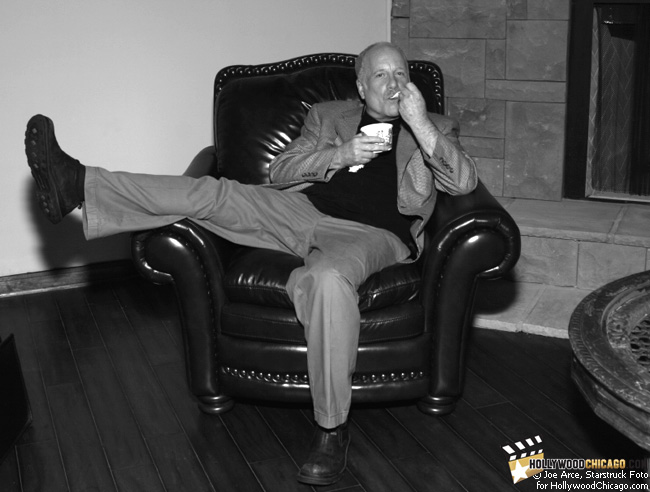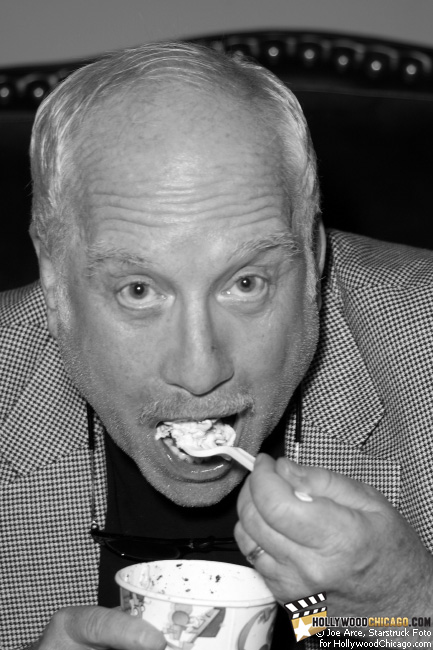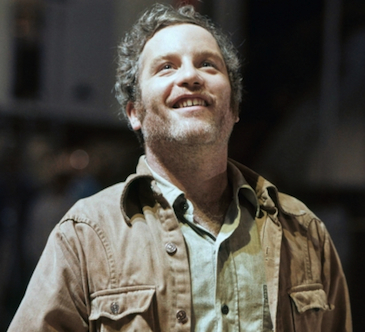CHICAGO – Patrick McDonald of HollywoodChicago.com appears on “The Morning Mess” with Dan Baker on WBGR-FM (Monroe, Wisconsin) on March 21st, 2024, reviewing the new streaming series “Manhunt” – based on the bestseller by James L. Swanson – currently streaming on Apple TV+.
Interview: An Ice Cream Social With Oscar Winner Richard Dreyfuss
CHICAGO – Actor Richard Dreyfuss is comfortable. This was on display as he was eating ice cream while talking about his career and life, just before an appearance at the brand new Hollywood Palms Cinema in Naperville, Ill.
Dreyfuss made a huge splash in the 1970s starring in the triptych of classic films: “American Graffiti,” “Jaws,” and “Close Encounters of the Third Kind.” He won his Best Actor Oscar – the youngest actor in Academy Award history to do so at the time – playing Elliott Garfield in the comedy, “The Goodbye Girl.”
 Photo credit: Joe Arce of Starstruck Foto for HollywoodChicago.com |
He continued with great films throughout his career, including roles in “Down and Out in Beverly Hills,” “What About Bob?,” another Best Actor nomination for “Mr Holland’s Opus” and “W” as Vice President Dick Cheney.
Now “semi-retired,” Mr. Dreyfuss puts his energies into the Dreyfuss Initiative, a non-profit foundation to encourage the teaching of civics in American schools.
HollywoodChicago.com caught up with Richard Dreyfuss during the grand opening week of the spectacular new Hollywood Palms Cinema in Naperville, Illinois, where he was introducing a couple of his films. His talked about his early career track, his passion for activism and a surprising story about the film “Always.”
HollywoodChicago: Your mother was a peace and political activist and you were a conscientious objector during the Vietnam War. How important is that background activism to your life and how does it manifest itself in your personal philosophy today?
Richard Dreyfess: It’s an incredibly profitable position (laughs).
I come from a very politically active family and my grandmother is always saying to me ‘I’m rolling over in my grave if you don’t say something.’ So it’s a little eerie, but then I say something.
HC: You played a number of conservative political archetypes: the fictional Bob Rumson in ‘The American President,’ Al Haig in ‘The Day Reagan was Shot’ and Vice President Dick Cheney in ‘W’. What did you connect to as an actor that allowed you to create characters that have personal ideologies that are opposite to your own?
RD: What is the difference between that and any actor playing a bank robber like Dillinger? A bad guy is a bad guy. Inside every actor is a fantasy that you fulfill and some of them are fantasies of being a great father or a great lover or a swashbuckler or Adolf Hitler or Jesus Christ or Dick Cheney.
 Photo credit: Joe Arce of Starstruck Foto for HollywoodChicago.com |
HC: What perspective did you gain about the life cycle and the American experience playing Mr. Holland, from a young man to middle age, especially since it was set during a similar era that you had lived through?
RD: It was clear to me before then, but brought home pretty vividly, that there are three acts in life, and you either know that you’re entering your third act or you don’t. Sooner or later it becomes inescapable, because there is something screwed up about ‘homo sapiens 4.1’ update. And it is constantly crashing.
When you walk by a window when you are 10 years old, you look 10, you feel 10. There you walk by when you’re 15 and you’re 15. But when you get to age 45, there is a little disconnect, as if the film is out of synch. And at 55, there is a definite disconnect between what you’re seeing and how you’re feeling.
And then one day you walk by a window and you say, who the f**k is that? And you realize that’s you, and it’s an old Jewish man in the window.
I don’t think God set out to do that. I think there is going to be another update. And in that update, everybody will have a secretary and no one will be out of synch with their age.
HC: In the 1960s, in all the parts of episodic television that you did, was there ever an opportunity to be a regular on a show, and what do you remember most about those days?
RD: I was the happiest unemployed actor in Hollywood. And I taught a class in how to be the happiest unemployed actor in Hollywood. And I interviewed casting directors, writers and producers of TV shows. And the only requirement for the class was that you already had to be a member of the guild.
So there was about 500 people in the audience and I would do topics like ‘How to Take Over an Interview,’ ‘How to Make Your Agent Your Best Friend’ and ‘How to Make a Casting Agent Wake Up in the Middle of the Night and Say I’ve Gotta Get Richard a Job.’ And there was ways to do that.
The only argument I’ve had on these times, and I still have it, is when I say I never had a picture or a resume. The kids go nuts, they never understand. And I say what is the point of having a picture or a resume? To be remembered. But you know that most of the time that picture goes right into the waste basket.
I’d rather run my car through a building. Then you’ll remember me. I don’t want to waste my money on a picture.
 Richard Dreyfuss Has a ‘Close Encounter’ Photo credit: Sony Pictures Home Entertainment |
HC: Having worked with many of the great contemporary film directors, what do you think the biggest contribution will be from them and the era you’ve worked in when the history of the first 100 years of film are written in the future?
RD: First of all, it’s not over. Second of all, we’ve already decided that the early 1970s were the golden age. And I don’t know that it was, but certainly the directors and writers were allowed more freedom of choice. And when their films became successful the studios then said, now that you’re successful we’ll decide these things and everything changed.
One corporate head of one of the studios lost his credibility completely and utterly with one sentence. He visited one of his sets, which happened to be one of my sets, the largest indoor set ever built. And he looked around and said, ‘why aren’t all these people working?’ And that was the end of an era. (laughs)
HC: Since you co-starred with her twice, in totally different roles, what is your favorite Holly Hunter story?
RD: My favorite Holly Hunter story is a performance she gave Off-Broadway. Which was so great it was like weird.
As far as stories, I don’t really catalog my mind like that. But on the set of ‘Always’ [1989], we were so in love with the original version, ‘A Guy Named Joe’ [1943] that we were paralyzed. When you watch the film, you see it. There is a sense of a sacred don’t-f**k-with-that-movie. It paralyzed the film.
HC: You speak often of perspective and enlightenment, especially from an educational standpoint. With the complete information age available on a desktop computer and internet line, do you think the future of education will be more expansive or simply more narrowed to individual tastes, because of the nature of our choices?
RD: That is entirely and completely up to you. You have to answer first a very important question – who runs what? Do you run the technology or does the technology run you? If you decide the technology, as we seem to be, that the technology runs us, we are doomed. There will not be a ‘city on the hill’ and our children will never believe that there was.
If, however, we believe we control our technology and we can make it was it needs to be, then we could fulfill the ‘magical mystery tour’ of the internet – which is both magic and mystery – because we have never had a tool which was potentially infinite. And that is what the internet is. If we can manage to keep it infinite and at the same time decide on a standard research methodology, there will be no ending.
 | By PATRICK McDONALD |



Naperville window
Richard dreyfuss… he is legendary man with extraordinary characteristics… I just love naperville smallest town in Chicago but it is getting publicly worldwide famous for its naperville roofing and naperville siding.. what u think about it???